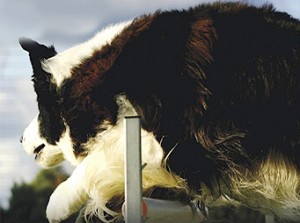The Fundamentals of Canine Locomotion
440 – November/December, 2017
BY WILLIAM GIVEN
 Dogs come in many different sizes, from the towering Irish Wolfhound all the way down to the diminutive Chi- huahua. Construction, weight and natural balance all dif- fer. Most breeds are slightly longer than tall. Some are square and a few are long in body but have short legs. Some breeds are no- ticeably front-heavy, with very few being heavier at the rear end. Regardless of breed, all of these dogs have to be able to impress the judge by transporting their fame in a straight line when moved, and with their back parallel to the ground.
Dogs come in many different sizes, from the towering Irish Wolfhound all the way down to the diminutive Chi- huahua. Construction, weight and natural balance all dif- fer. Most breeds are slightly longer than tall. Some are square and a few are long in body but have short legs. Some breeds are no- ticeably front-heavy, with very few being heavier at the rear end. Regardless of breed, all of these dogs have to be able to impress the judge by transporting their fame in a straight line when moved, and with their back parallel to the ground.
It should not be assumed that simply because a dog is of favor- able conformation it must be a good mover. In theory, a well-constructed dog that presents the beautiful picture of balance when stacked should be able to move easily and with little effort. Even when his neck, shoulders, back and four limbs are all that could be desired, he can still be found lacking when being gaited. However, this is not always the case. A great many dogs may meet some very specific requirements of the most demanding standards until they are asked to move.
All must move their front legs, hind legs and all four feet in a rhythmic sequence which may be made even more difficult given the specific elements of their construction. The front feet must keep pace with the hind feet, and the rear with the fore whether the dog has legs of a more reasonable length and stand relatively close, or whether the legs are short and the front feet are placed so very far in front of the hind feet.
Let us take a quick look at two breeds of German origin, which have both benefited greatly from the efforts of breeders in Great Britain and the United States to refine them. First, we will examine the Boxer. His height from the withers to the ground equals the length of his body. His limbs are so very well- proportioned that when he moves at a brisk pace, his hind feet advance to a point on the ground very close to where the front feet had just been.
Click here to read the complete article440 – November/December, 2017
Short URL: http://caninechronicle.com/?p=135195
Comments are closed











